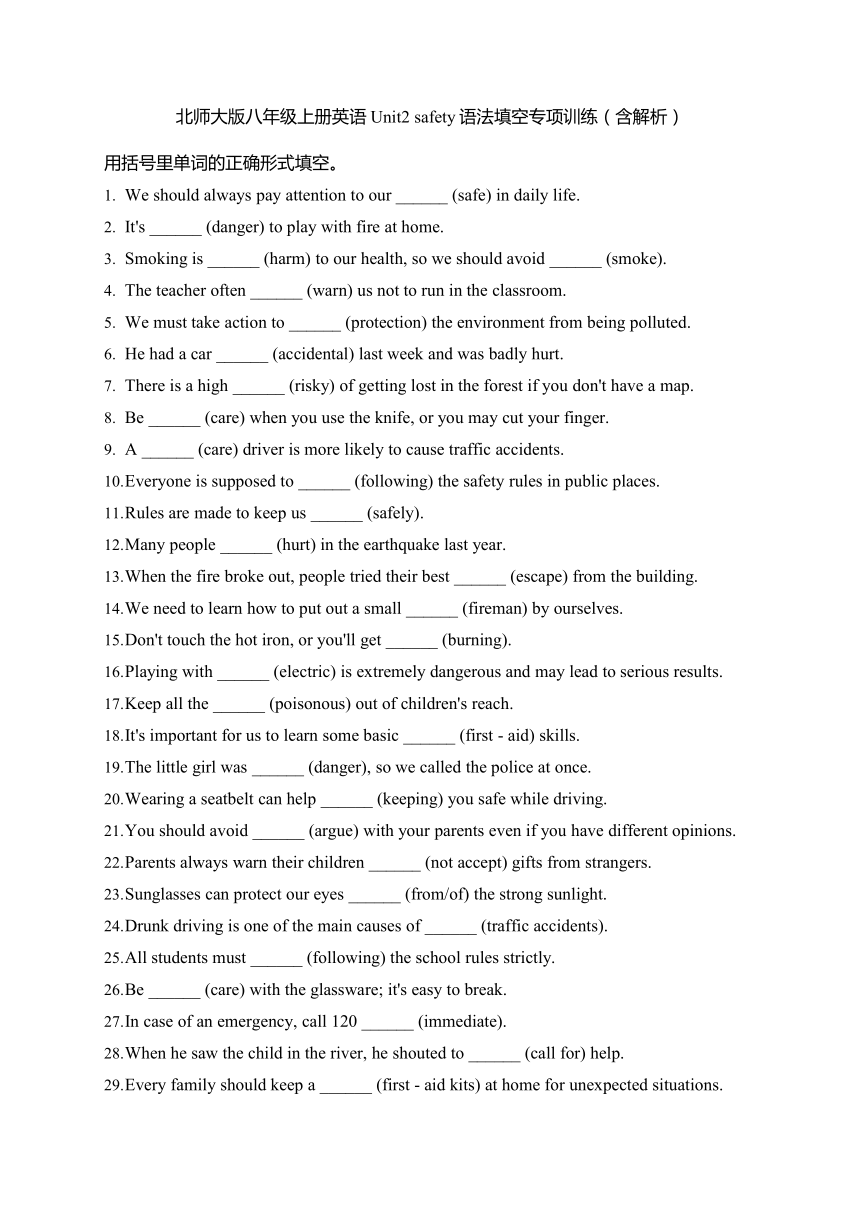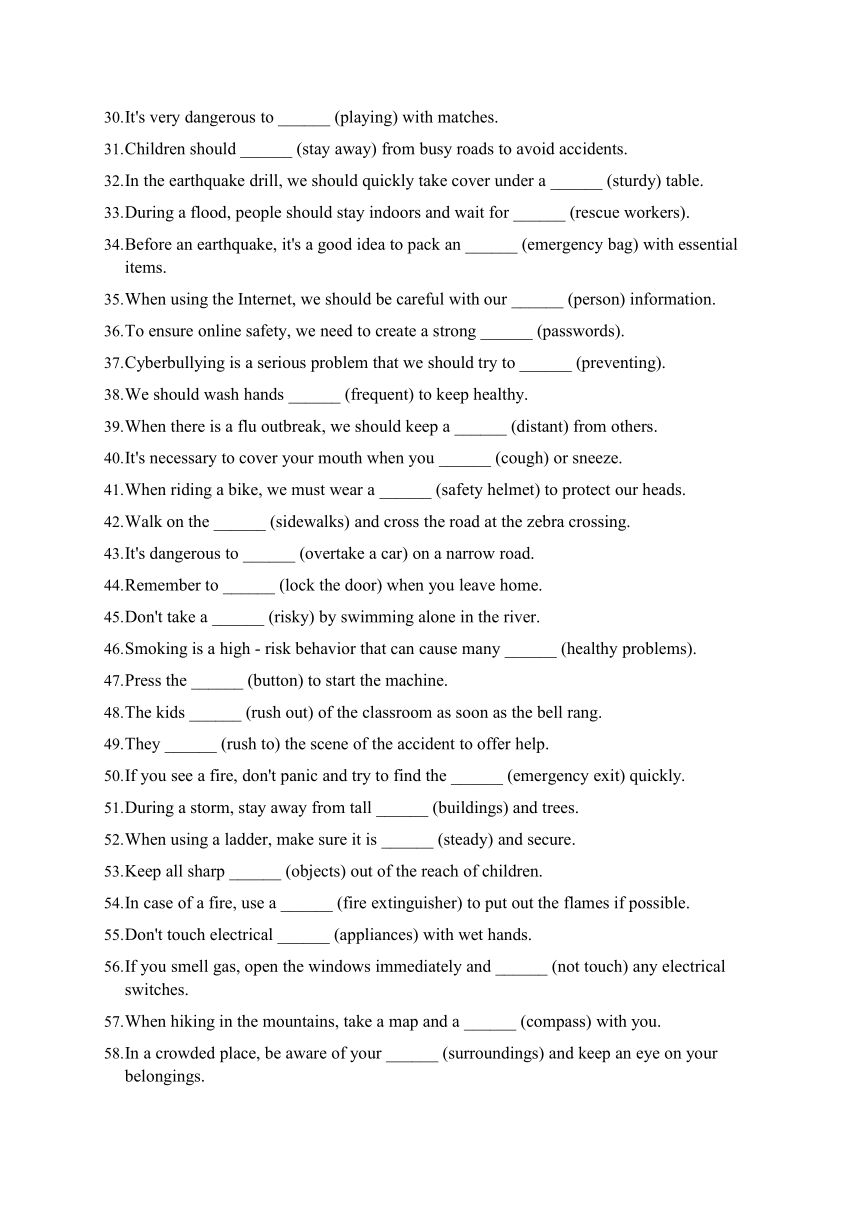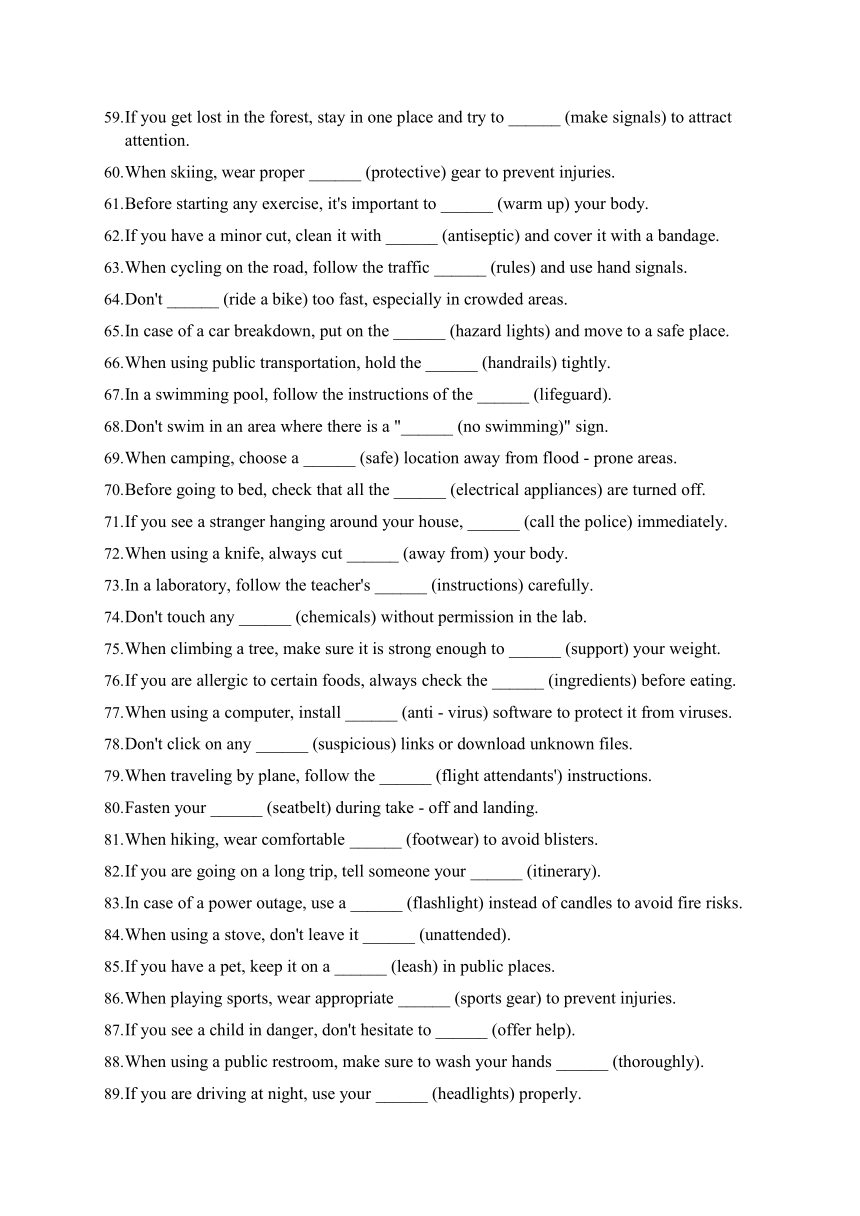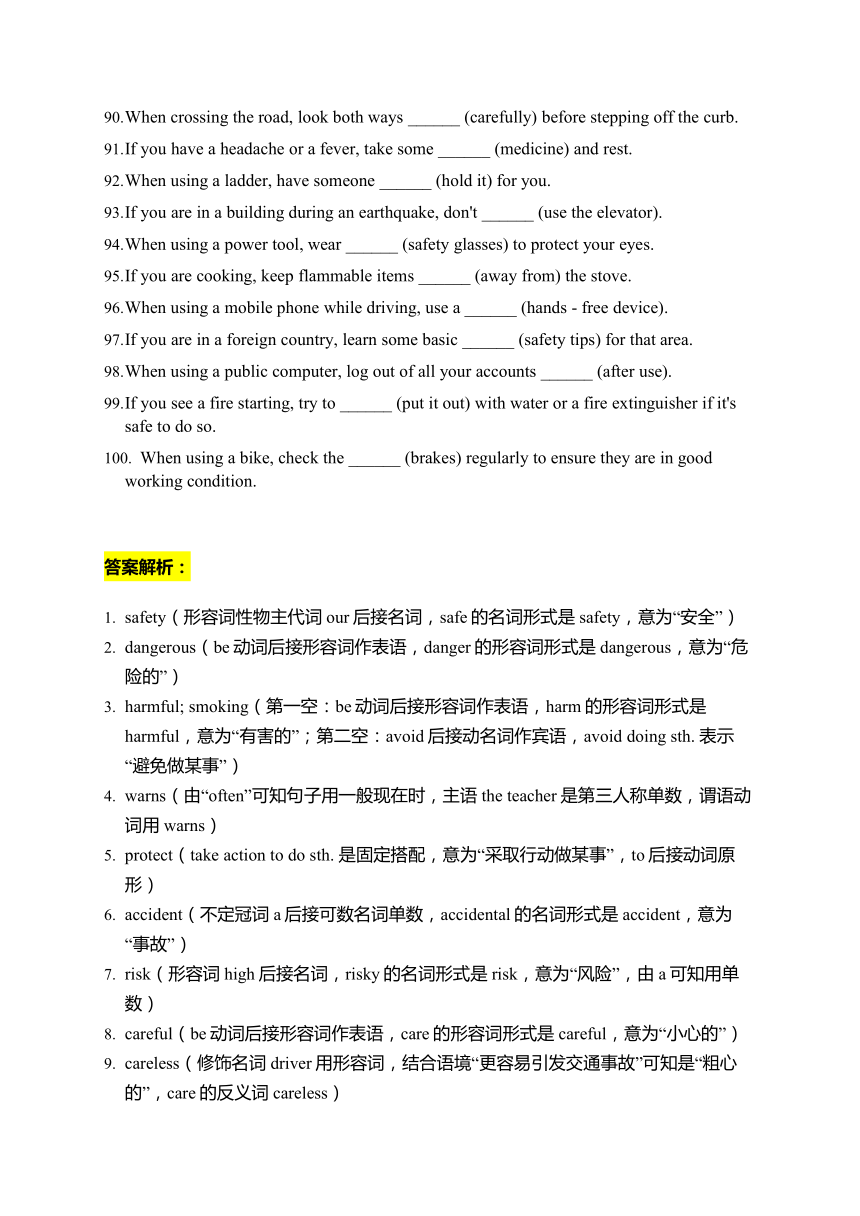北师大版(2024)八年级上册英语Unit2 safety语法填空专项训练(含解析)
文档属性
| 名称 | 北师大版(2024)八年级上册英语Unit2 safety语法填空专项训练(含解析) |  | |
| 格式 | docx | ||
| 文件大小 | 22.6KB | ||
| 资源类型 | 教案 | ||
| 版本资源 | 北师大版 | ||
| 科目 | 英语 | ||
| 更新时间 | 2025-08-18 22:27:37 | ||
图片预览




文档简介
北师大版八年级上册英语Unit2 safety语法填空专项训练(含解析)
用括号里单词的正确形式填空。
We should always pay attention to our ______ (safe) in daily life.
It's ______ (danger) to play with fire at home.
Smoking is ______ (harm) to our health, so we should avoid ______ (smoke).
The teacher often ______ (warn) us not to run in the classroom.
We must take action to ______ (protection) the environment from being polluted.
He had a car ______ (accidental) last week and was badly hurt.
There is a high ______ (risky) of getting lost in the forest if you don't have a map.
Be ______ (care) when you use the knife, or you may cut your finger.
A ______ (care) driver is more likely to cause traffic accidents.
Everyone is supposed to ______ (following) the safety rules in public places.
Rules are made to keep us ______ (safely).
Many people ______ (hurt) in the earthquake last year.
When the fire broke out, people tried their best ______ (escape) from the building.
We need to learn how to put out a small ______ (fireman) by ourselves.
Don't touch the hot iron, or you'll get ______ (burning).
Playing with ______ (electric) is extremely dangerous and may lead to serious results.
Keep all the ______ (poisonous) out of children's reach.
It's important for us to learn some basic ______ (first - aid) skills.
The little girl was ______ (danger), so we called the police at once.
Wearing a seatbelt can help ______ (keeping) you safe while driving.
You should avoid ______ (argue) with your parents even if you have different opinions.
Parents always warn their children ______ (not accept) gifts from strangers.
Sunglasses can protect our eyes ______ (from/of) the strong sunlight.
Drunk driving is one of the main causes of ______ (traffic accidents).
All students must ______ (following) the school rules strictly.
Be ______ (care) with the glassware; it's easy to break.
In case of an emergency, call 120 ______ (immediate).
When he saw the child in the river, he shouted to ______ (call for) help.
Every family should keep a ______ (first - aid kits) at home for unexpected situations.
It's very dangerous to ______ (playing) with matches.
Children should ______ (stay away) from busy roads to avoid accidents.
In the earthquake drill, we should quickly take cover under a ______ (sturdy) table.
During a flood, people should stay indoors and wait for ______ (rescue workers).
Before an earthquake, it's a good idea to pack an ______ (emergency bag) with essential items.
When using the Internet, we should be careful with our ______ (person) information.
To ensure online safety, we need to create a strong ______ (passwords).
Cyberbullying is a serious problem that we should try to ______ (preventing).
We should wash hands ______ (frequent) to keep healthy.
When there is a flu outbreak, we should keep a ______ (distant) from others.
It's necessary to cover your mouth when you ______ (cough) or sneeze.
When riding a bike, we must wear a ______ (safety helmet) to protect our heads.
Walk on the ______ (sidewalks) and cross the road at the zebra crossing.
It's dangerous to ______ (overtake a car) on a narrow road.
Remember to ______ (lock the door) when you leave home.
Don't take a ______ (risky) by swimming alone in the river.
Smoking is a high - risk behavior that can cause many ______ (healthy problems).
Press the ______ (button) to start the machine.
The kids ______ (rush out) of the classroom as soon as the bell rang.
They ______ (rush to) the scene of the accident to offer help.
If you see a fire, don't panic and try to find the ______ (emergency exit) quickly.
During a storm, stay away from tall ______ (buildings) and trees.
When using a ladder, make sure it is ______ (steady) and secure.
Keep all sharp ______ (objects) out of the reach of children.
In case of a fire, use a ______ (fire extinguisher) to put out the flames if possible.
Don't touch electrical ______ (appliances) with wet hands.
If you smell gas, open the windows immediately and ______ (not touch) any electrical switches.
When hiking in the mountains, take a map and a ______ (compass) with you.
In a crowded place, be aware of your ______ (surroundings) and keep an eye on your belongings.
If you get lost in the forest, stay in one place and try to ______ (make signals) to attract attention.
When skiing, wear proper ______ (protective) gear to prevent injuries.
Before starting any exercise, it's important to ______ (warm up) your body.
If you have a minor cut, clean it with ______ (antiseptic) and cover it with a bandage.
When cycling on the road, follow the traffic ______ (rules) and use hand signals.
Don't ______ (ride a bike) too fast, especially in crowded areas.
In case of a car breakdown, put on the ______ (hazard lights) and move to a safe place.
When using public transportation, hold the ______ (handrails) tightly.
In a swimming pool, follow the instructions of the ______ (lifeguard).
Don't swim in an area where there is a "______ (no swimming)" sign.
When camping, choose a ______ (safe) location away from flood - prone areas.
Before going to bed, check that all the ______ (electrical appliances) are turned off.
If you see a stranger hanging around your house, ______ (call the police) immediately.
When using a knife, always cut ______ (away from) your body.
In a laboratory, follow the teacher's ______ (instructions) carefully.
Don't touch any ______ (chemicals) without permission in the lab.
When climbing a tree, make sure it is strong enough to ______ (support) your weight.
If you are allergic to certain foods, always check the ______ (ingredients) before eating.
When using a computer, install ______ (anti - virus) software to protect it from viruses.
Don't click on any ______ (suspicious) links or download unknown files.
When traveling by plane, follow the ______ (flight attendants') instructions.
Fasten your ______ (seatbelt) during take - off and landing.
When hiking, wear comfortable ______ (footwear) to avoid blisters.
If you are going on a long trip, tell someone your ______ (itinerary).
In case of a power outage, use a ______ (flashlight) instead of candles to avoid fire risks.
When using a stove, don't leave it ______ (unattended).
If you have a pet, keep it on a ______ (leash) in public places.
When playing sports, wear appropriate ______ (sports gear) to prevent injuries.
If you see a child in danger, don't hesitate to ______ (offer help).
When using a public restroom, make sure to wash your hands ______ (thoroughly).
If you are driving at night, use your ______ (headlights) properly.
When crossing the road, look both ways ______ (carefully) before stepping off the curb.
If you have a headache or a fever, take some ______ (medicine) and rest.
When using a ladder, have someone ______ (hold it) for you.
If you are in a building during an earthquake, don't ______ (use the elevator).
When using a power tool, wear ______ (safety glasses) to protect your eyes.
If you are cooking, keep flammable items ______ (away from) the stove.
When using a mobile phone while driving, use a ______ (hands - free device).
If you are in a foreign country, learn some basic ______ (safety tips) for that area.
When using a public computer, log out of all your accounts ______ (after use).
If you see a fire starting, try to ______ (put it out) with water or a fire extinguisher if it's safe to do so.
When using a bike, check the ______ (brakes) regularly to ensure they are in good working condition.
答案解析:
safety(形容词性物主代词our后接名词,safe的名词形式是safety,意为“安全”)
dangerous(be动词后接形容词作表语,danger的形容词形式是dangerous,意为“危险的”)
harmful; smoking(第一空:be动词后接形容词作表语,harm的形容词形式是harmful,意为“有害的”;第二空:avoid后接动名词作宾语,avoid doing sth. 表示“避免做某事”)
warns(由“often”可知句子用一般现在时,主语the teacher是第三人称单数,谓语动词用warns)
protect(take action to do sth. 是固定搭配,意为“采取行动做某事”,to后接动词原形)
accident(不定冠词a后接可数名词单数,accidental的名词形式是accident,意为“事故”)
risk(形容词high后接名词,risky的名词形式是risk,意为“风险”,由a可知用单数)
careful(be动词后接形容词作表语,care的形容词形式是careful,意为“小心的”)
careless(修饰名词driver用形容词,结合语境“更容易引发交通事故”可知是“粗心的”,care的反义词careless)
follow(be supposed to do sth. 是固定搭配,意为“应该做某事”,to后接动词原形)
safe(keep后接形容词作宾语补足语,safely的形容词形式是safe,意为“安全的”)
were hurt(由“last year”可知句子用一般过去时,主语many people与hurt是被动关系,用被动语态,结构为“were + 过去分词”)
to escape(try one's best to do sth. 是固定搭配,意为“尽某人最大努力做某事”)
fire(形容词small后接名词,fireman意为“消防员”,结合语境“扑灭小型火灾”可知用fire,意为“火”)
burned/burnt(get后接过去分词构成被动语态,burn的过去分词是burned或burnt,意为“被烧伤”)
electricity(介词with后接名词,electric的名词形式是electricity,意为“电”)
poisons(all后接可数名词复数,poisonous的名词形式是poison,此处指“有毒物品”,用复数poisons)
first-aid(修饰名词skills用形容词,first-aid是复合形容词,意为“急救的”)
in danger(结合语境“我们立刻报警”可知女孩“处于危险中”,用固定短语in danger)
keep(help后接动词原形作宾语补足语,help do sth. 意为“帮助做某事”)
arguing(avoid后接动名词作宾语,avoid doing sth. 表示“避免做某事”)
not to accept(warn sb. not to do sth. 是固定搭配,意为“警告某人不要做某事”)
from(protect...from...是固定搭配,意为“保护……免受……伤害”)
traffic accidents(介词of后接名词短语,traffic accidents意为“交通事故”,此处用复数表泛指)
follow(情态动词must后接动词原形)
careful(be动词后接形容词作表语,be careful with意为“小心对待……”)
immediately(修饰动词call用副词,immediate的副词形式是immediately,意为“立刻”)
call for(shout to do sth. 表示“大声喊着做某事”,to后接动词原形,call for help意为“呼救”)
first-aid kit(不定冠词a后接可数名词单数,first-aid kit意为“急救箱”)
play(It's dangerous to do sth. 是固定句型,it是形式主语,不定式是真正主语,to后接动词原形)
stay away(情态动词should后接动词原形,stay away from意为“远离……”)
sturdy(修饰名词table用形容词,sturdy意为“坚固的”)
rescue workers(介词for后接名词短语,rescue workers意为“救援人员”,用复数表泛指)
emergency bag(不定冠词an后接可数名词单数,emergency bag意为“应急包”)
personal(修饰名词information用形容词,person的形容词形式是personal,意为“个人的”)
password(不定冠词a后接可数名词单数,passwords的单数形式是password,意为“密码”)
prevent(try to do sth. 是固定搭配,意为“努力做某事”,to后接动词原形)
frequently(修饰动词wash用副词,frequent的副词形式是frequently,意为“频繁地”)
distance(不定冠词a后接可数名词单数,distant的名词形式是distance,keep a distance from意为“与……保持距离”)
cough(when引导的时间状语从句中,主语是you,时态是一般现在时,谓语动词用原形)
safety helmet(不定冠词a后接可数名词单数,safety helmet意为“安全帽”)
sidewalks(定冠词the后接名词,sidewalks意为“人行道”,用复数表泛指)
overtake a car(It's dangerous to do sth. 中,不定式是真正主语,to后接动词原形短语)
lock the door(remember to do sth. 是固定搭配,意为“记得做某事”,to后接动词原形短语)
risk(不定冠词a后接可数名词单数,risky的名词形式是risk,take a risk意为“冒险”)
health problems(many后接可数名词复数,health problems意为“健康问题”)
button(定冠词the后接名词,button意为“按钮”,此处用单数表特指)
rushed out(由“as soon as the bell rang”可知句子用一般过去时,rush out的过去式是rushed out,意为“冲出去”)
rushed to(描述过去发生的动作,用一般过去时,rush to意为“冲向……”,过去式是rushed to)
emergency exit(定冠词the后接名词短语,emergency exit意为“紧急出口”,此处用单数表特指)
buildings(形容词tall后接名词,buildings意为“建筑物”,用复数表泛指)
steady(be动词后接形容词作表语,steady意为“稳固的”)
objects(形容词sharp后接名词,objects意为“物体”,用复数表泛指)
fire extinguisher(不定冠词a后接可数名词单数,fire extinguisher意为“灭火器”)
appliances(形容词electrical后接名词,appliances意为“电器”,用复数表泛指)
don't touch(and连接并列祈使句,前半句是肯定祈使句,后半句是否定祈使句,用don't + 动词原形)
compass(不定冠词a后接可数名词单数,compass意为“指南针”)
surroundings(形容词性物主代词your后接名词,surroundings意为“周围环境”,常用复数)
make signals(try to do sth. 中,to后接动词原形短语,make signals意为“发信号”)
protective(修饰名词gear用形容词,protective意为“防护的”)
warm up(It's important to do sth. 中,to后接动词原形短语,warm up意为“热身”)
antiseptic(介词with后接名词,antiseptic意为“消毒剂”,此处用不可数名词)
rules(名词traffic后接名词,rules意为“规则”,用复数表泛指,traffic rules意为“交通规则”)
ride a bike(don't后接动词原形短语,ride a bike意为“骑自行车”)
hazard lights(定冠词the后接名词短语,hazard lights意为“危险警示灯”,常用复数)
handrails(定冠词the后接名词,handrails意为“扶手”,用复数表泛指)
lifeguard(定冠词the后接名词,lifeguard意为“救生员”,此处用单数表特指)
no swimming(修饰名词sign用复合形容词,no swimming意为“禁止游泳”)
safe(修饰名词location用形容词,safe意为“安全的”)
electrical appliances(定冠词the后接名词短语,electrical appliances意为“电器”,用复数表泛指)
call the police(祈使句中用动词原形短语,call the police意为“报警”)
away from(固定短语cut away from意为“从……处切割开”)
instructions(名词所有格teacher's后接名词,instructions意为“指示”,用复数表泛指)
chemicals(any后接可数名词复数或不可数名词,chemicals意为“化学品”,用复数表泛指)
support(enough to do sth. 中,to后接动词原形,support意为“支撑”)
ingredients(定冠词the后接名词,ingredients意为“成分”,用复数表泛指)
anti-virus(修饰名词software用复合形容词,anti-virus意为“抗病毒的”)
suspicious(修饰名词links用形容词,suspicious意为“可疑的”)
flight attendants'(修饰名词instructions用名词所有格,flight attendants'意为“空乘人员的”)
seatbelt(形容词性物主代词your后接名词,seatbelt意为“安全带”,此处用单数)
footwear(形容词comfortable后接名词,footwear意为“鞋类”,是不可数名词)
itinerary(形容词性物主代词your后接名词,itinerary意为“行程”,此处用单数)
flashlight(不定冠词a后接可数名词单数,flashlight意为“手电筒”)
unattended(leave sth. + 形容词表示“使某物处于……状态”,unattended意为“无人看管的”)
leash(不定冠词a后接可数名词单数,leash意为“皮带”)
sports gear(形容词appropriate后接名词短语,sports gear意为“运动装备”,gear是不可数名词)
offer help(hesitate to do sth. 中,to后接动词原形短语,offer help意为“提供帮助”)
thoroughly(修饰动词wash用副词,thoroughly意为“彻底地”)
headlights(形容词性物主代词your后接名词,headlights意为“前灯”,常用复数)
carefully(修饰动词look用副词,carefully意为“仔细地”)
medicine(some后接不可数名词或可数名词复数,medicine意为“药”,是不可数名词)
hold it(have sb. do sth. 是固定搭配,意为“让某人做某事”,后接动词原形短语)
use the elevator(祈使句的否定形式don't后接动词原形短语)
safety glasses(名词短语safety glasses意为“安全眼镜”,常用复数)
away from(固定短语keep...away from意为“使……远离……”)
hands-free device(不定冠词a后接可数名词单数,hands-free device意为“免提设备”)
safety tips(some后接可数名词复数,safety tips意为“安全提示”)
after use(介词after后接名词use,构成介词短语作状语,意为“使用后”)
put it out(try to do sth. 中,to后接动词原形短语,put out意为“扑灭”)
brakes(定冠词the后接名词,brakes意为“刹车”,常用复数)
用括号里单词的正确形式填空。
We should always pay attention to our ______ (safe) in daily life.
It's ______ (danger) to play with fire at home.
Smoking is ______ (harm) to our health, so we should avoid ______ (smoke).
The teacher often ______ (warn) us not to run in the classroom.
We must take action to ______ (protection) the environment from being polluted.
He had a car ______ (accidental) last week and was badly hurt.
There is a high ______ (risky) of getting lost in the forest if you don't have a map.
Be ______ (care) when you use the knife, or you may cut your finger.
A ______ (care) driver is more likely to cause traffic accidents.
Everyone is supposed to ______ (following) the safety rules in public places.
Rules are made to keep us ______ (safely).
Many people ______ (hurt) in the earthquake last year.
When the fire broke out, people tried their best ______ (escape) from the building.
We need to learn how to put out a small ______ (fireman) by ourselves.
Don't touch the hot iron, or you'll get ______ (burning).
Playing with ______ (electric) is extremely dangerous and may lead to serious results.
Keep all the ______ (poisonous) out of children's reach.
It's important for us to learn some basic ______ (first - aid) skills.
The little girl was ______ (danger), so we called the police at once.
Wearing a seatbelt can help ______ (keeping) you safe while driving.
You should avoid ______ (argue) with your parents even if you have different opinions.
Parents always warn their children ______ (not accept) gifts from strangers.
Sunglasses can protect our eyes ______ (from/of) the strong sunlight.
Drunk driving is one of the main causes of ______ (traffic accidents).
All students must ______ (following) the school rules strictly.
Be ______ (care) with the glassware; it's easy to break.
In case of an emergency, call 120 ______ (immediate).
When he saw the child in the river, he shouted to ______ (call for) help.
Every family should keep a ______ (first - aid kits) at home for unexpected situations.
It's very dangerous to ______ (playing) with matches.
Children should ______ (stay away) from busy roads to avoid accidents.
In the earthquake drill, we should quickly take cover under a ______ (sturdy) table.
During a flood, people should stay indoors and wait for ______ (rescue workers).
Before an earthquake, it's a good idea to pack an ______ (emergency bag) with essential items.
When using the Internet, we should be careful with our ______ (person) information.
To ensure online safety, we need to create a strong ______ (passwords).
Cyberbullying is a serious problem that we should try to ______ (preventing).
We should wash hands ______ (frequent) to keep healthy.
When there is a flu outbreak, we should keep a ______ (distant) from others.
It's necessary to cover your mouth when you ______ (cough) or sneeze.
When riding a bike, we must wear a ______ (safety helmet) to protect our heads.
Walk on the ______ (sidewalks) and cross the road at the zebra crossing.
It's dangerous to ______ (overtake a car) on a narrow road.
Remember to ______ (lock the door) when you leave home.
Don't take a ______ (risky) by swimming alone in the river.
Smoking is a high - risk behavior that can cause many ______ (healthy problems).
Press the ______ (button) to start the machine.
The kids ______ (rush out) of the classroom as soon as the bell rang.
They ______ (rush to) the scene of the accident to offer help.
If you see a fire, don't panic and try to find the ______ (emergency exit) quickly.
During a storm, stay away from tall ______ (buildings) and trees.
When using a ladder, make sure it is ______ (steady) and secure.
Keep all sharp ______ (objects) out of the reach of children.
In case of a fire, use a ______ (fire extinguisher) to put out the flames if possible.
Don't touch electrical ______ (appliances) with wet hands.
If you smell gas, open the windows immediately and ______ (not touch) any electrical switches.
When hiking in the mountains, take a map and a ______ (compass) with you.
In a crowded place, be aware of your ______ (surroundings) and keep an eye on your belongings.
If you get lost in the forest, stay in one place and try to ______ (make signals) to attract attention.
When skiing, wear proper ______ (protective) gear to prevent injuries.
Before starting any exercise, it's important to ______ (warm up) your body.
If you have a minor cut, clean it with ______ (antiseptic) and cover it with a bandage.
When cycling on the road, follow the traffic ______ (rules) and use hand signals.
Don't ______ (ride a bike) too fast, especially in crowded areas.
In case of a car breakdown, put on the ______ (hazard lights) and move to a safe place.
When using public transportation, hold the ______ (handrails) tightly.
In a swimming pool, follow the instructions of the ______ (lifeguard).
Don't swim in an area where there is a "______ (no swimming)" sign.
When camping, choose a ______ (safe) location away from flood - prone areas.
Before going to bed, check that all the ______ (electrical appliances) are turned off.
If you see a stranger hanging around your house, ______ (call the police) immediately.
When using a knife, always cut ______ (away from) your body.
In a laboratory, follow the teacher's ______ (instructions) carefully.
Don't touch any ______ (chemicals) without permission in the lab.
When climbing a tree, make sure it is strong enough to ______ (support) your weight.
If you are allergic to certain foods, always check the ______ (ingredients) before eating.
When using a computer, install ______ (anti - virus) software to protect it from viruses.
Don't click on any ______ (suspicious) links or download unknown files.
When traveling by plane, follow the ______ (flight attendants') instructions.
Fasten your ______ (seatbelt) during take - off and landing.
When hiking, wear comfortable ______ (footwear) to avoid blisters.
If you are going on a long trip, tell someone your ______ (itinerary).
In case of a power outage, use a ______ (flashlight) instead of candles to avoid fire risks.
When using a stove, don't leave it ______ (unattended).
If you have a pet, keep it on a ______ (leash) in public places.
When playing sports, wear appropriate ______ (sports gear) to prevent injuries.
If you see a child in danger, don't hesitate to ______ (offer help).
When using a public restroom, make sure to wash your hands ______ (thoroughly).
If you are driving at night, use your ______ (headlights) properly.
When crossing the road, look both ways ______ (carefully) before stepping off the curb.
If you have a headache or a fever, take some ______ (medicine) and rest.
When using a ladder, have someone ______ (hold it) for you.
If you are in a building during an earthquake, don't ______ (use the elevator).
When using a power tool, wear ______ (safety glasses) to protect your eyes.
If you are cooking, keep flammable items ______ (away from) the stove.
When using a mobile phone while driving, use a ______ (hands - free device).
If you are in a foreign country, learn some basic ______ (safety tips) for that area.
When using a public computer, log out of all your accounts ______ (after use).
If you see a fire starting, try to ______ (put it out) with water or a fire extinguisher if it's safe to do so.
When using a bike, check the ______ (brakes) regularly to ensure they are in good working condition.
答案解析:
safety(形容词性物主代词our后接名词,safe的名词形式是safety,意为“安全”)
dangerous(be动词后接形容词作表语,danger的形容词形式是dangerous,意为“危险的”)
harmful; smoking(第一空:be动词后接形容词作表语,harm的形容词形式是harmful,意为“有害的”;第二空:avoid后接动名词作宾语,avoid doing sth. 表示“避免做某事”)
warns(由“often”可知句子用一般现在时,主语the teacher是第三人称单数,谓语动词用warns)
protect(take action to do sth. 是固定搭配,意为“采取行动做某事”,to后接动词原形)
accident(不定冠词a后接可数名词单数,accidental的名词形式是accident,意为“事故”)
risk(形容词high后接名词,risky的名词形式是risk,意为“风险”,由a可知用单数)
careful(be动词后接形容词作表语,care的形容词形式是careful,意为“小心的”)
careless(修饰名词driver用形容词,结合语境“更容易引发交通事故”可知是“粗心的”,care的反义词careless)
follow(be supposed to do sth. 是固定搭配,意为“应该做某事”,to后接动词原形)
safe(keep后接形容词作宾语补足语,safely的形容词形式是safe,意为“安全的”)
were hurt(由“last year”可知句子用一般过去时,主语many people与hurt是被动关系,用被动语态,结构为“were + 过去分词”)
to escape(try one's best to do sth. 是固定搭配,意为“尽某人最大努力做某事”)
fire(形容词small后接名词,fireman意为“消防员”,结合语境“扑灭小型火灾”可知用fire,意为“火”)
burned/burnt(get后接过去分词构成被动语态,burn的过去分词是burned或burnt,意为“被烧伤”)
electricity(介词with后接名词,electric的名词形式是electricity,意为“电”)
poisons(all后接可数名词复数,poisonous的名词形式是poison,此处指“有毒物品”,用复数poisons)
first-aid(修饰名词skills用形容词,first-aid是复合形容词,意为“急救的”)
in danger(结合语境“我们立刻报警”可知女孩“处于危险中”,用固定短语in danger)
keep(help后接动词原形作宾语补足语,help do sth. 意为“帮助做某事”)
arguing(avoid后接动名词作宾语,avoid doing sth. 表示“避免做某事”)
not to accept(warn sb. not to do sth. 是固定搭配,意为“警告某人不要做某事”)
from(protect...from...是固定搭配,意为“保护……免受……伤害”)
traffic accidents(介词of后接名词短语,traffic accidents意为“交通事故”,此处用复数表泛指)
follow(情态动词must后接动词原形)
careful(be动词后接形容词作表语,be careful with意为“小心对待……”)
immediately(修饰动词call用副词,immediate的副词形式是immediately,意为“立刻”)
call for(shout to do sth. 表示“大声喊着做某事”,to后接动词原形,call for help意为“呼救”)
first-aid kit(不定冠词a后接可数名词单数,first-aid kit意为“急救箱”)
play(It's dangerous to do sth. 是固定句型,it是形式主语,不定式是真正主语,to后接动词原形)
stay away(情态动词should后接动词原形,stay away from意为“远离……”)
sturdy(修饰名词table用形容词,sturdy意为“坚固的”)
rescue workers(介词for后接名词短语,rescue workers意为“救援人员”,用复数表泛指)
emergency bag(不定冠词an后接可数名词单数,emergency bag意为“应急包”)
personal(修饰名词information用形容词,person的形容词形式是personal,意为“个人的”)
password(不定冠词a后接可数名词单数,passwords的单数形式是password,意为“密码”)
prevent(try to do sth. 是固定搭配,意为“努力做某事”,to后接动词原形)
frequently(修饰动词wash用副词,frequent的副词形式是frequently,意为“频繁地”)
distance(不定冠词a后接可数名词单数,distant的名词形式是distance,keep a distance from意为“与……保持距离”)
cough(when引导的时间状语从句中,主语是you,时态是一般现在时,谓语动词用原形)
safety helmet(不定冠词a后接可数名词单数,safety helmet意为“安全帽”)
sidewalks(定冠词the后接名词,sidewalks意为“人行道”,用复数表泛指)
overtake a car(It's dangerous to do sth. 中,不定式是真正主语,to后接动词原形短语)
lock the door(remember to do sth. 是固定搭配,意为“记得做某事”,to后接动词原形短语)
risk(不定冠词a后接可数名词单数,risky的名词形式是risk,take a risk意为“冒险”)
health problems(many后接可数名词复数,health problems意为“健康问题”)
button(定冠词the后接名词,button意为“按钮”,此处用单数表特指)
rushed out(由“as soon as the bell rang”可知句子用一般过去时,rush out的过去式是rushed out,意为“冲出去”)
rushed to(描述过去发生的动作,用一般过去时,rush to意为“冲向……”,过去式是rushed to)
emergency exit(定冠词the后接名词短语,emergency exit意为“紧急出口”,此处用单数表特指)
buildings(形容词tall后接名词,buildings意为“建筑物”,用复数表泛指)
steady(be动词后接形容词作表语,steady意为“稳固的”)
objects(形容词sharp后接名词,objects意为“物体”,用复数表泛指)
fire extinguisher(不定冠词a后接可数名词单数,fire extinguisher意为“灭火器”)
appliances(形容词electrical后接名词,appliances意为“电器”,用复数表泛指)
don't touch(and连接并列祈使句,前半句是肯定祈使句,后半句是否定祈使句,用don't + 动词原形)
compass(不定冠词a后接可数名词单数,compass意为“指南针”)
surroundings(形容词性物主代词your后接名词,surroundings意为“周围环境”,常用复数)
make signals(try to do sth. 中,to后接动词原形短语,make signals意为“发信号”)
protective(修饰名词gear用形容词,protective意为“防护的”)
warm up(It's important to do sth. 中,to后接动词原形短语,warm up意为“热身”)
antiseptic(介词with后接名词,antiseptic意为“消毒剂”,此处用不可数名词)
rules(名词traffic后接名词,rules意为“规则”,用复数表泛指,traffic rules意为“交通规则”)
ride a bike(don't后接动词原形短语,ride a bike意为“骑自行车”)
hazard lights(定冠词the后接名词短语,hazard lights意为“危险警示灯”,常用复数)
handrails(定冠词the后接名词,handrails意为“扶手”,用复数表泛指)
lifeguard(定冠词the后接名词,lifeguard意为“救生员”,此处用单数表特指)
no swimming(修饰名词sign用复合形容词,no swimming意为“禁止游泳”)
safe(修饰名词location用形容词,safe意为“安全的”)
electrical appliances(定冠词the后接名词短语,electrical appliances意为“电器”,用复数表泛指)
call the police(祈使句中用动词原形短语,call the police意为“报警”)
away from(固定短语cut away from意为“从……处切割开”)
instructions(名词所有格teacher's后接名词,instructions意为“指示”,用复数表泛指)
chemicals(any后接可数名词复数或不可数名词,chemicals意为“化学品”,用复数表泛指)
support(enough to do sth. 中,to后接动词原形,support意为“支撑”)
ingredients(定冠词the后接名词,ingredients意为“成分”,用复数表泛指)
anti-virus(修饰名词software用复合形容词,anti-virus意为“抗病毒的”)
suspicious(修饰名词links用形容词,suspicious意为“可疑的”)
flight attendants'(修饰名词instructions用名词所有格,flight attendants'意为“空乘人员的”)
seatbelt(形容词性物主代词your后接名词,seatbelt意为“安全带”,此处用单数)
footwear(形容词comfortable后接名词,footwear意为“鞋类”,是不可数名词)
itinerary(形容词性物主代词your后接名词,itinerary意为“行程”,此处用单数)
flashlight(不定冠词a后接可数名词单数,flashlight意为“手电筒”)
unattended(leave sth. + 形容词表示“使某物处于……状态”,unattended意为“无人看管的”)
leash(不定冠词a后接可数名词单数,leash意为“皮带”)
sports gear(形容词appropriate后接名词短语,sports gear意为“运动装备”,gear是不可数名词)
offer help(hesitate to do sth. 中,to后接动词原形短语,offer help意为“提供帮助”)
thoroughly(修饰动词wash用副词,thoroughly意为“彻底地”)
headlights(形容词性物主代词your后接名词,headlights意为“前灯”,常用复数)
carefully(修饰动词look用副词,carefully意为“仔细地”)
medicine(some后接不可数名词或可数名词复数,medicine意为“药”,是不可数名词)
hold it(have sb. do sth. 是固定搭配,意为“让某人做某事”,后接动词原形短语)
use the elevator(祈使句的否定形式don't后接动词原形短语)
safety glasses(名词短语safety glasses意为“安全眼镜”,常用复数)
away from(固定短语keep...away from意为“使……远离……”)
hands-free device(不定冠词a后接可数名词单数,hands-free device意为“免提设备”)
safety tips(some后接可数名词复数,safety tips意为“安全提示”)
after use(介词after后接名词use,构成介词短语作状语,意为“使用后”)
put it out(try to do sth. 中,to后接动词原形短语,put out意为“扑灭”)
brakes(定冠词the后接名词,brakes意为“刹车”,常用复数)
同课章节目录
